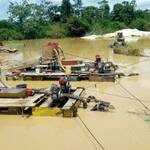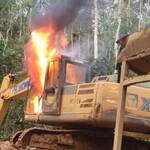When President Nana Addo Dankwa Akufo-Addo opened the valve to pour first Oil from the Jubilee South East (JSE) Project, it signified the beginning of doubling Ghana’s crude oil production from the 51,756 barrels per day in 2022 to more than 100,000 barrels of oil per day.
This is good news because crude oil production in Ghana has been on the decline at an average of 10% per annum for three consecutive years,
Therefore, the first oil from the Jubilee South East (JSE) Project is seen as the commencement of sustainable development of petroleum resources to attract new investors and reverse the decline in petroleum production.
The project was undertaken by Tullow, in collaboration with the Ghana National Petroleum Company (GNPC), Kosmos Energy, Jubilee Oil Holdings Limited, and Petro SA.
The success of the Jubilee South East Project aligns with the broader Jubilee field plan, aimed at bolstering gross production from the field’s eastern side.
With a collective investment of some $1 billion, the target of maintaining production above 100,000 barrels of oil per day from the field, by year end, is well within reach.
With some 300 million barrels of oil estimated within the Jubilee field, this triumph augments government’s confidence in other prospects across the nation.
President Akufo-Addo indicated that the triumph of the Jubilee South East Project reinforced the government’s determination to encourage further investments from partners in the TEN field project.
He said the expansion would consolidate the Government’s achievements in the oil and gas sector, adding, “the Tweneboa, Enyenra, Ntomme (TEN) field, enriched with substantial gas reserves, is pivotal to our nation’s natural gas production and the stability of our power sector in the coming years.”
President Akufo-Addo stated that he was aware of discussions in the media and other forums regarding the prospect of making extensive use of Ghana’s domestically produced natural gas to satisfy the needs of the country’s power sector.
He stated that the JSE is vital for earning revenue and addressing the country’s power generation needs.
“Players in the oil and gas sector have been advocating for a commitment by Government to consider deploying more natural gas produced domestically to solve the challenges in providing sustainable electricity for individuals, households and businesses.
“I want to re-emphasize our commitment to expedite discussions and agree mutually acceptable terms for a combined gas sales agreement between Tullow, its Joint Venture Partners and Government.
“This step will pave the way for heightened success and revenue generation in the sector, fostering the use of natural gas for domestic purposes, and the creation of allied industries. Such utilisation is especially critical in meeting approximately half of our power generation requirements,” he stated.
Addressing local content and Ghanaian participation in upstream petroleum operations, President Akufo-Addo noted that the government’s position on local content was not just about supplying ancillary services to the sector but also having a stake in the resources.
“We must collectively endeavour to train our people to get to a level where they have the capacity to be able to participate fully in the industry, and our position is to strengthen all training vehicles in the various industries of the Energy sector, like the Accelerated Oil and Gas Capacity Building Programme, to ensure that Ghanaians have the relevant certification to become competitive, and play a fuller role in the industry.
“That fuller role will be most effectively anchored when we ensure Ghanaian equity participation in the upstream development of our oil and gas resources,” he stated.
With Ghana as a signatory to the Paris Agreement, which requires the country to reduce carbon dioxide emission levels, President Akufo-Addo said it had become imperative for Ghana to develop plans and strategies for the creation of a net-zero energy sector.
“However, as I have reiterated on previous occasions, whilst working hard to combat the effects of climate change, it is also important to protect our development by making sure that our oil reserves do not become stranded assets, but, rather, a catalyst for our economic growth. Our position remains unchanged,” he added.
The President reaffirmed that Ghana had everything going for it as an investment destination: a stable political system, a robust legal framework, a viable fiscal regime, a good telecommunications infrastructure, a dedicated, skilled labour force, and warm, hospitable people.
“I wish to assure the investor community of our continued support to ensure that their investments are safe in law and in fact, and that they can flourish in our country within the context of our relevant laws. Our doors are always open for conversations on your presence in Ghana, and I hope the good, warm relations we have fostered over the years will continue to endure in the times ahead,” he added.
Statistics on production declines since 2019
A volume of 71,439,585 barrels (bbls) was produced in 2019, but declined to 66,926,806 bbls in 2020, representing 6.32%.
Production further declined to 55,050,391 bbls in 2021, representing 17.75% and then to 51,756,481 bbls in 2022, showing a 5.98% decrease.
Jubilee produced 30,523,813 bbls representing 59% of total output with SGN producing 12,619,846.12 bbls, while TEN produced 8,612,822 bbls representing 24% and 17% respectively.
Jubilee field increased production by 11.7% from the 2021 output of 27,335,481 bbls to 30,523,813 bbls in 2022 due to the successful drilling and completion campaign of three wells.
On the other hand, TEN Field’s production declined by 28% from 11,978,064 bbls in 2021 to 8,612,822 bbls in 2022 due to technical challenges on the Enyenra reservoir.
The SGN Field recorded a reduced output of 19.8% as it produced 12,619,846.12 bbls in 2022 compared to 15,736,846.10 bbls in 2021, due to planned shutdown activities and facility equipment upsets.
A 7.7% decrease in gas production, where a total of 253,555.05 million Standard Cubic Feet (MMSCF) of raw gas including Associated Gas [AG] and Non-Associated Gas (NAG) was produced in 2022 from the three Fields.
These are lower compared to the 2021 volume of 256,262.04 MMSCF of raw gas produced.
The SGN Field which is relatively gas-concentrated produced the highest volume of combined AG and NAG of 129,394.66 MMSCF while the Jubilee and TEN Fields produced 68,481.76 MMSCF and 55,678.63 MMSCF.
- Oquaye Report to revitalise NPP for 2028 – Bawumia - 24 April 2025
- Thursday, April 24, 2025 Newspaper Headlines - 24 April 2025
- Govt grants Gold fields 12 months to handover Damang Mine - 23 April 2025



